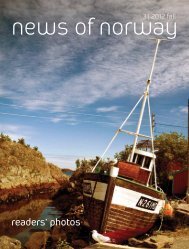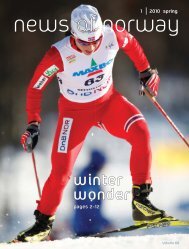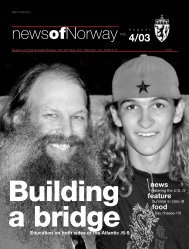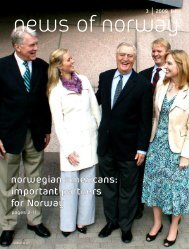You also want an ePaper? Increase the reach of your titles
YUMPU automatically turns print PDFs into web optimized ePapers that Google loves.
film<br />
worth<br />
the ride<br />
by anne myklebust<br />
Usually, the old adage, “this is the first day <strong>of</strong> the rest <strong>of</strong> your<br />
life,” exudes comfort rather than despair. But in the Norwegian<br />
film “O’Horten,” aging train driver Odd Horten finds anything<br />
but comfort in contemplating his future. And he will have to face the<br />
rest <strong>of</strong> his days sooner rather than later, as he only has one last train to<br />
steer across the mountains <strong>of</strong> western <strong>Norway</strong> before retirement looms.<br />
This delightful mixture <strong>of</strong> melancholy and comedy opens in U.S. theaters<br />
in May this year.<br />
“O’Horten” is written and directed by Bent Hamer, a name which<br />
will sound familiar to many film buffs. Three years ago, Hamer directed<br />
the U.S. film “Factotum,” an adaptation <strong>of</strong> a novel by Charles<br />
Bukowski, which featured Matt Dillon and Marisa Tomei. “O’Horten,”<br />
Hamer’s fifth feature, is more mellow than the poignant “Kitchen<br />
Stories,” which has become a staple <strong>of</strong> contemporary Scandinavian<br />
filmmaking.<br />
“O’Horten” explores the familiar, yet never boring, theme <strong>of</strong> locating<br />
a stable platform in one’s existence. For Odd Horten, that platform<br />
is – literally as well as figuratively – his job. When he realizes that his<br />
future existence is one without fixed timetables or familiar destinations,<br />
the ground no longer feels so solid under his feet.<br />
As one has come to expect from Hamer, the film’s depth lies in its<br />
direction as much as in its dialogue. Hamer has taken great care<br />
to ensure that all parts <strong>of</strong> the film reflect just how central the railroad<br />
is to Horten’s life. In the opening segments, we see that even his<br />
small apartment lies in the shadow <strong>of</strong> the tracks.<br />
The film’s well-rounded production package has not gone unnoticed<br />
by U.S. critics, and was described as “aces,” by Variety’s Alissa<br />
Simon, who states that the film, “provides a warm and gently humorous<br />
divertissement that should be appreciated by niche arthouse auds<br />
worldwide.”<br />
The thought that went into the creation <strong>of</strong> the soundtrack underlines<br />
the quality <strong>of</strong> the film. John Erik Kaada, described by<br />
Norwegian newspaper Dagbladet as “<strong>Norway</strong>’s film music<br />
guru,” has done an excellent job accentuating the sparse dialogue. His<br />
music becomes a voice just as significant as those <strong>of</strong> the film's characters.<br />
As Alexis Madden states in a review for Moving Pictures:<br />
“Kaada’s score subtly influences the viewer’s mood, adding the underlying<br />
magic from which the audience can feel the film as well as<br />
observe it.”<br />
As one would suspect, creating this “underlying magic” was anything<br />
but easy. In an exclusive interview, John Erik Kaada commented<br />
on the collaborative process <strong>of</strong> creating this unique soundtrack. “The<br />
collaboration between the director and the writer varies from film to<br />
film. In some productions, we literally work side by side, while in others,<br />
one is left alone to make the music, and the director will leave most<br />
decisions to the composer. I’m not really sure which method <strong>of</strong> working<br />
I prefer. Somewhere in between would be ideal. Which was the<br />
case with O’Horten. The whole process began with me sending a series<br />
<strong>of</strong> snippets and suggestions on a couple <strong>of</strong> CDs. Then Bent would<br />
select what he liked the most, and I would work from there. This was<br />
before shooting started. Often I get ideas from reading the script, in<br />
which case I will start recording immediately,” the composer said.<br />
Considering Kaada’s success in <strong>Norway</strong>, one might not expect him<br />
to dream about working on a U.S. production in the future. As it turns<br />
out, he does. “I am <strong>of</strong>ten envious <strong>of</strong> composers who are able to be<br />
overtly pompous, and create music with a huge orchestra. There are not<br />
a lot <strong>of</strong> Norwegian films this would work for – “O’Horten,” would certainly<br />
not be one <strong>of</strong> them. Bent Hamer’s characters are so frail. It is difficult<br />
to find the balance between how much music and pomposity one<br />
can add. Usually, with these kinds <strong>of</strong> films, it is the simple things that<br />
work best.”<br />
PHOTO BY JOACHIM DRAGELAND ISAKSEN<br />
1997:<br />
"The Other Side <strong>of</strong> Sunday"<br />
("Søndagsengler") by Berit<br />
Nesheim is nominated for an<br />
Oscar in the best foreign film<br />
category, and subsequently<br />
released in movie theaters in<br />
the United States.<br />
2002:<br />
Director Petter Næss's "Elling" is<br />
nominated for a best foreign<br />
film Oscar. The film is based on<br />
Ingvar Ambjørnsen's novel<br />
"Blood brothers" from 1996, one<br />
<strong>of</strong> four books in a series about a<br />
neurotic Elling.<br />
www.norway.org | 7












